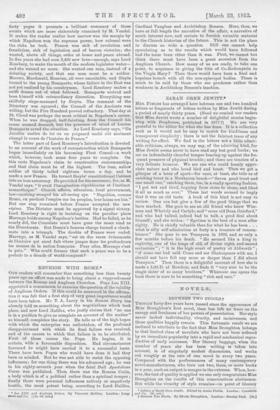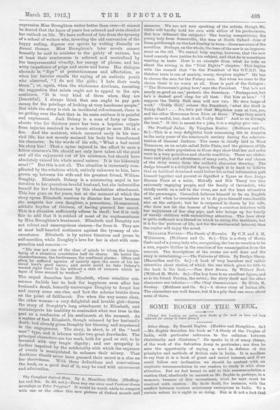NOVELS.
BETWEEN TWO STOOLS.t
THOUGH forty-five years have passed since the appearance of Miss Broughton's first novel, time has left no trace on the energy and freshness of her powers of presentation. Her style never lacked individuality, vivacity, and incisiveness, and these qualities happily remain. This fortunate result we are inclined to attribute to the fact that Miss Broughton belongs to that limited class of novelists who have not been seduced by an immediate popularity into a rapid and mechanical repro- duction of early successes. Her literary baggage, when the number of years she has been writing is taken into account, is of singularly modest dimensions, and works out roughly at the rate of one novel in every two years. Compared with the performances of many contemporary novel-manufacturers, who turn out two, three, or more books in a year, such an output is meagre in the extreme. When, how- ever, the test of quality is applied we can only congratulate Miss Broughton on the results of this conscientious abstinence. But while the vivacity of style remains—in point of literary Letters of Sarah Orns Jewitt. Edited by Annie Fields. London : Constable and Co. [Go. not.] t Between Two Stouts. By Rhoda Broughton. London: Stanley Paul. [Gs.]
expression Miss Broughton writes better than ever—it cannot be denied that the lapse of years has sobered and even clouded her outlook on life. We have suffered of late from the tyranny of a school of writers who, inverting the old convention of the happy ending, depress our spirits by writing dismally on dismal themes. Miss Broughton's later novels cannot honestly be said to minister to the gaiety of nations, but at least their sombreness is relieved and neutralized by her temperamental vivacity, her energy of phrase, and her witty impatience of prigs and snobs and bores. Her dialogue
abounds in " digs " at pretentiousness and affectation, as when her heroine recalls the saying of an (esthetic youth who observed, " I do not like girls ; I hate their nasty bloom"; or, again, when the wholesome Arethusa, resenting the suggestion that saints ought not to appeal to the eye, continues, "It is very kind of them when they are [beautiful]. I always think that one ought to pay gate money for the privilege of looking at very handsome people." But while the story is rich in incidental refreshment, there is no getting over the fact that in its main outlines it is painful and unpleasant. Jack Delany is a man of forty or there- abouts who for thirteen years has been a hopeless cripple from injuries received in a heroic, attempt to save life at a fire. And the accident, which occurred early in his mar- ried life, has not merely maimed his body but transformed his character. In the words of his wife, " What a had moral his story has ! That a spine injured in the effort to save a fellow creature's life should not only have taken all the good and all the enjoyment out of his existence, but should have
absolutely ruined his whole moral nature. It is too hideously cruel !" But this is not all. The situation is immensely com- plicated by the relations which, entirely unknown to him, have grown up 'between his wife and his greatest friend, William Doughty. Elizabeth Delany is a ministering angel in her devotion to her querulous invalid husband, but she indemnifies herself for her forbearance by this clandestine attachment. This has gone on for years, but at the moment at which the story opens Elizabeth resolves to dismiss her lover because she suspects her own daughter, a precocious, ill-mannered, athletic hoyden of thirteen, of having guessed her secret. This is a situation sufficiently odious in itself; but it is only fair to add that it is robbed of most of its unpleasantness by Miss Broughton's treatment. Elizabeth and Doughty are not robust and unscrupulous sinners—far from it. They are at most half-hearted mutineers against the tyranny of cir- cumstance. Elizabeth is by nature timorous and prone to self-sacrifice, while Doughty's love for her is shot with com- punction and remorse :—
" His was not one of the class of minds to whom the irregu- larity of a situation constitutes half its charm. Ho hated the clandestineness, the furtiveness, the continual alarms. Often and often he suffered agonies of anxiety upon tho score of his be- loved love's good name ; and never could ho take Delany's wasted right hand in his without a stab of remorse which no lapse of time seemed to weaken."
The sequel describes how Elizabeth, whose sensitive con- science follicle her to look for happiness even after her husband's death, honestly encourages Doughty to forget her and marry some one else, and how the scheme breaks down on the point of fulfilment. For when the way seems clear, the other woman—a very delightful and lovable girl—learns the story of Doughty's long attachment to Elizabeth, and misinterprets his inability to contradict what was true in the past as a confession of his sentiments at the moment. As a matter of fact Elizabeth, though released by her husband's death, had already given Doughty her blessing and acquiesced in the engagement. The story, in short, is of the " hard case" type, and it labours under two great drawbacks. The principal characters are too weak, both for good or evil, to be invested with any tragic dignity ; and our sympathy is further impaired by the artificiality with which the sequence of events is manipulated to enhance their misery. That Arethusa should never have guessed their secret is a slur on her shrewdness. With these deductions and reservations
the book, or a good deal of it, may be read with amusement and admiration.







































 Previous page
Previous page